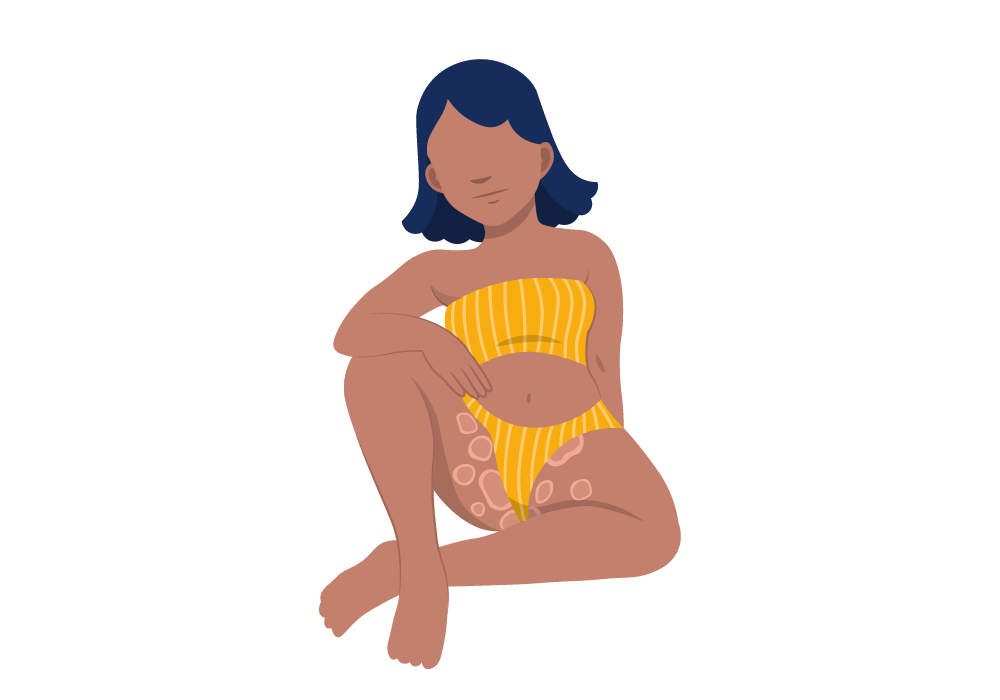Back
What is Lichen Sclerosus? Discussion with New Jersey Based Professional Pelvic Floor Physical Therapy Team
By Dr. Zarina Vitebsky, DPT, MSPT, PRPC, TPS, LPF, DN on 9/20/2023

Lichen Sclerosus: Understanding and Managing Genital Skin Changes
Lichen Sclerosus (LS) is more than just an aesthetic concern; it can be a distressing and uncomfortable condition. If you’ve noticed painful, thin patches of white, delicate skin around your genital area, it's essential to understand what may be happening and how it can be managed.
What is Lichen Sclerosus?
Lichen Sclerosus is a long-term skin disorder that affects the genital and perianal regions, characterized by whitish, thin skin patches. The condition can be unnerving for many, but understanding its nature can provide some reassurance.
Nature and Progression:
LS is not a sign of uncleanliness or infection, and it's not contagious. It often starts as small, pink or white bumps which, if not addressed, can progressively transform into larger areas of thinning, dry, and scarred skin. Over time, the skin may also become tighter, leading to potential discomfort or pain.Causes and Risk Factors:
The precise cause of LS remains a mystery, but there are several theories and correlations:Immune Dysfunction: Some experts believe LS may have an autoimmune component, where the body's immune system mistakenly attacks healthy skin cells.
Hormonal Links: There's a suggestion that reduced levels of estrogen might be associated with LS, although the strength of this correlation is still being explored.
Genetic Predisposition; There may be a hereditary component to LS. It is believed that some individuals carry genes that make them more susceptible, with certain triggers like trauma or injury sparking its onset.
Environmental Factors: There's ongoing research into potential environmental triggers or contributors to the development of LS.
How is Lichen Sclerosus Treated?
There is a range of treatments available, tailored to the severity of the condition and individual needs.
Pharmacological Treatments:
Topical Corticosteroids: Often the first line of treatment, these reduce inflammation and can halt the progression of the disease.
Topical Calcineurin Inhibitors: These are non-steroidal medications that reduce skin inflammation.
Retinoids: Derived from Vitamin A, these can be used in specific cases to treat skin symptoms.
Physical Therapy:
Pelvic floor physical therapy can play a significant role in managing Lichen Sclerosus. It enhances blood flow to the area, improves tissue elasticity, reduces scar tissue, and boosts muscle strength and endurance.
The constant irritation from Lichen Sclerosus can cause the central nervous system to be persistently in a state of heightened sensitivity, leading to increased pain perception and muscle tension. Physical therapy aims to soothe this hyperactive state, offering pain relief and relaxation.
Over time, the skin changes from Lichen Sclerosus may lead to issues beyond pain. The scar tissue can cause skin tightness, affecting intimacy, complicating bowel movements, and even making wearing certain clothing types painful. Expert therapists recognize these challenges and can provide techniques and strategies to help manage them.
What to Expect at Pelvic Health Physical Therapy?
Seeking treatment starts with an in-depth assessment. Here's what you can anticipate:
Musculoskeletal Examination: A comprehensive check of your posture, gait, spine, hips, and other relevant structures. This holistic approach ensures a complete understanding of any associated or contributing factors.
External Exam: By inspecting the affected skin areas, therapists can evaluate tissue quality, check for any fibrotic tissue, scarring, or odors.
Internal Exam: With the patient's permission and using lubricant for comfort, a gentle internal exam may be performed to assess the condition and tone of the pelvic floor muscles.
Tailored Treatment Plan: Based on the findings, a personalized care plan is designed, ensuring each patient's unique needs are addressed.
If you suspect you have Lichen Sclerosus or have been diagnosed and are seeking therapeutic solutions, we invite you to explore the expertise we offer at the Pelvic Health Physical Therapy Center in Madison, NJ. Schedule an evaluation and assessment by calling 908-443-9880 or emailing us at receptionmadison@pelvichealthnj.com. Your well-being is our mission.
Read More:
Dry Needling for C-Section Scars and Postpartum Recovery By Dr. Christine Martirez PT, DPT on 10/15/2024 Learn how dry needling can be used for c-section scars and c-section recovery How Red Light Therapy Can Be Used to Treat Pelvic Floor Dysfunctions By Dr. Christine Martirez PT, DPT on 10/15/2024 Learn about red light therapy and how it can be used to treat pelvic floor dysfunctions
Are you ready to live pain free?
Request An Appointment